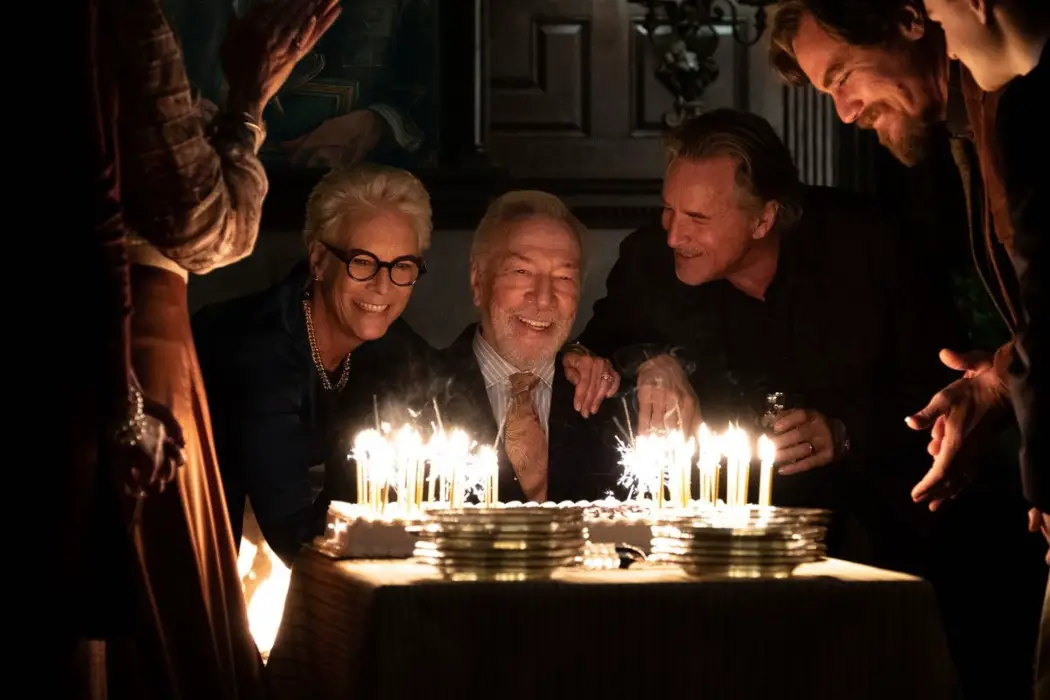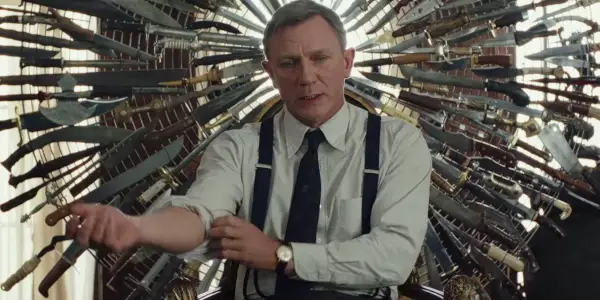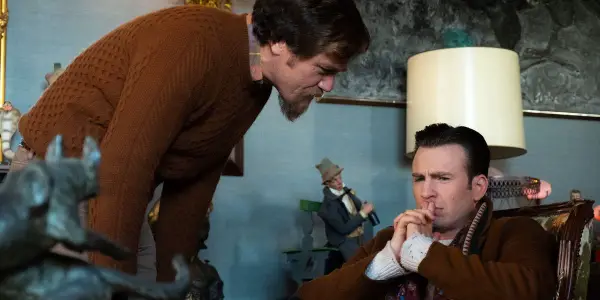KNIVES OUT: Rian Johnson’s Suspenseful Lampoon Of The 1%

I'm a student at the University of North Carolina at…
Since its initial announcement, Rian Johnson‘s Knives Out has been preordained as one of 2019’s must-watch films. The director of Star Wars: The Last Jedi (which is the best Star Wars movie since the 1980s, let’s get that out of the way now) using his newfound clout to assemble an all-star murder mystery in the style of Agatha Christie — who wouldn’t be excited for that? When said cast includes Daniel Craig, Chris Evans, Jamie Lee Curtis, Toni Collette, and a handful of other brilliant actors, the whole endeavor becomes even more enticing.
Knives Out has earned rave reviews since its premiere at the Toronto International Film Festival, and it’s poised for breakout success over the coming weeks. The deafening buzz around the comedic thriller makes this review a challenging one to write: is there any way to be significantly less enthusiastic than the consensus without appearing too negative? While Knives Out is amusing, politically savvy, and often a very twisty, quasi-Hitchc*ckian treat, it can also be, disappointingly, something of a mixed bag.
A Bizarre Murder and a Legendary Detective
Johnson‘s whodunnit naturally begins with a shocking event: the discovery of the body of Harlan Thrombey (Christopher Plummer), an iconic writer who built a mystery novel empire for himself and his family. At first, with Harlan holding the dagger that appears to have cut his throat, it seems like a cut-and-dry case of suicide. One week after Harlan’s death, officers Elliott (Lakeith Stanfield) and Wagner (Noah Segan) arrive at the Thrombey estate to ask a few final questions to the members of the family. Joining the officers is Benoit Blanc (Craig), a world-famous, Hercule Poirot-esque private detective who has been summoned to the estate by a mysterious individual.
It’s safe to say that Blanc does not believe Harlan’s death was a suicide.

If Harlan was murdered, who are the suspects? Well, the family, of course. Linda Drysdale (Curtis) is Harlan’s oldest daughter, and she’s married to the sleazy Richard (Don Johnson). Could Richard have a motivation for murder after Harlan discovered his latest affair? What about Walt Thrombey (Michael Shannon), the head of Harlan’s publishing company, who was about to be cut out of that lucrative deal by his own father? There’s also the possibility that Joni Thrombey (Collette), the widow of one of Harlan’s sons, is behind it all — could a recent tiff with Harlan over college tuition for her daughter (Katherine Langford) have led her to commit the unspeakable?
The suspect list does not end there. There’s also Ransom Drysdale (Evans), Linda’s entitled trust-fund kid who has never worked a day in his life. With Harlan opting to cut off his inheritance, Ransom may want to find a way to make his grandfather pay. And then there’s Marta (Ana de Armas), Harlan’s longtime nurse and close confidante. Saddled with a condition that causes her to profusely vomit whenever she lies and equipped with a treasure trove of information from her boss, Marta may be the key to the whole bloody mystery.
Unconventional Structure Impresses & Confounds
Knives Out‘s first half hour is actually quite ingenious, introducing us to each despicable member of the Thrombey clan with a level of clarity and humorous precision. Through a series of tense interviews with Elliott and Wagner, writer/director Johnson smoothly sets the table for the dynamics and personal histories that form the bedrock of his elaborate mystery. We essentially see the same scene again and again, but the variations allow for some smart perspective shifts, often in ways that appear to the audience as self-serving for the wealthy individuals involved. Plus, it’s fun to see each of the characters slowly notice Blanc in the background, who lurks as an enigmatic, borderline dangerous force. It’s a terrific start to the film, and it promises something formally fascinating and genuinely unpredictable.

This is naturally a very difficult movie to talk about without divulging spoilers, so I’m going to try my best to maintain the secrets. But Johnson makes a very interesting — and very strange — choice at a certain point, and it’s a choice that alters so much of the film that I’d be remiss if I didn’t discuss it. Famously (and controversially, if you enter some awful corners of the internet) a fan of subverting audience expectations, the director offers what appears to be a concrete solution to the central mystery less than an hour into the film. There are plenty more twists and turns to be found, but after one crucial scene, it appears that certain elements are very much wrapped up (to specify more would be ill-advised).
It’s a bold decision, and it changes everything about the narrative: from our alignment with the characters to the very genre of the story. For my money, it’s a decision that doesn’t exactly pay off. Yes, the rather brilliant finale absolutely saves the film and clarifies some of Johnson‘s creative choices, but with this mid-film revelation, we’re left without much of a driving force for the narrative. At its best, this pivot forces Johnson to enter a mode that resembles Hitchc*ck‘s thrillers, generating tension from that blurring of audience identification with criminals and victims. At its worst, the middle stretch is generic and muddled without much in the way of intrigue or effectiveness.
Social Commentary: Satisfying, Yet Heavy-Handed
The whodunnit and the Hitchc*ckian thriller are only two of Knives Out‘s generic modes. There is, however, a third mode that is perhaps even more essential than the others: the class satire. Like Parasite, Us, and Ready or Not, this is another film that uses a familiar generic template to tell an anti-capitalist story of inequality, one that inevitably ends in the rich getting their much-needed comeuppance. The entire film can be boiled down to the relationship between Ana de Armas‘s Marta and the narcissistic Thrombey clan, who fashion themselves as self-made successes despite their immense privilege. In some ways, Johnson seems to be making his own riff on Get Out: a bastion of liberal wealthiness (though some of the Thrombeys are explicitly die-hard Trump fans) is parodied and torn apart by the very person they’ve taken advantage of for years and years.

Like many of Johnson‘s other core creative moves, this satirical twist is an inspired and occasionally terrific adjustment to the film’s principal formula. It is also so painfully on-the-nose that it lacks much actual bite. Of course, this shouldn’t be perceived as any kind of objection to the film’s political stance or impulse: I’m very much in favor of this recent stretch of socially conscious mainstream entertainment — though I’m a little less fond of explicit references to current events, which strike me as pandering to the very crowd it’s attempting to lampoon. Regardless, Knives Out makes some critical missteps on the path to its finale, and it’s essential to pinpoint what they are.
Much of it comes down to the film’s love of showmanship, a quality that’s to be expected in a murder mystery. But Johnson‘s love of telling us what’s going on — and exactly who these characters are at their core — can often make the film feel one-dimensional. Most of the Thrombeys are unlikable from the start, and even when there’s a hint of complexity, it’s instantly revealed to be a facade. This may be true to the deeply unequal world we live in, but the lack of depth to the characters is a detriment to the film itself. Ingenuity gives way to heavy-handedness, and that’s something Johnson struggles to overcome, even when he’s revealing his most impressive sleight of hand.
Knives Out: Conclusion
For all its faults, Knives Out is still a moderately enjoyable ride; it’s brisk and often engaging, even with a substantial running time of 130 minutes. And despite my numerous qualms, it’s highly likely that a second round with Johnson‘s film, with all of the twists and turns already revealed, will clarify some of my initial objections. From the moment the credits rolled, the possibility of a second viewing has been on my mind.
Yet barring a miraculous turn-around, I’ll probably still be a little less enamored by this one than everyone else. And that saddens me. Considering the pedigree of the talent involved, I was hoping for just a little more than a solid, yet flawed murder mystery. If you’re preparing to dive into this one over Thanksgiving, tempering your expectations ever so slightly might be a smart move.
What did you think of Knives Out? What is your favorite big-screen murder mystery? Let us know in the comments below!
Knives Out will be released on November 27, 2019 in the US and UK. For full international release dates, click here.
Does content like this matter to you?
Become a Member and support film journalism. Unlock access to all of Film Inquiry`s great articles. Join a community of like-minded readers who are passionate about cinema - get access to our private members Network, give back to independent filmmakers, and more.
I'm a student at the University of North Carolina at Chapel Hill. For 8 years, I've edited the blog Martin on Movies. This is where I review new releases, cover new trailers, and discuss important news in the entertainment industry. Some of my favorite movies- Casablanca, Inception, Singin' in the Rain, 2001: A Space Odyssey, The Wolf of Wall Street, The Nice Guys, La La Land, Airplane!, Skyfall, Raiders of the Lost Ark. You can find my other reviews and articles at Martin on Movies (http://martinonmovies.blogspot.com/).













